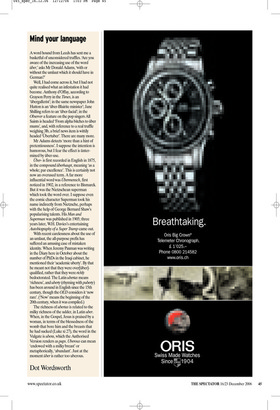Mind your language
A word hound from Leeds has sent me a basketful of unconsidered truffles. ‘Are you aware of the increasing use of the word über,’ asks Mr Donald Adams, ‘with or without the umlaut which it should have in German?’ Well, I had come across it, but I had not quite realised what an infestation it had become. Anthony d’Offay, according to Grayson Perry in the Times, is an ‘übergallerist’; in the same newspaper John Hutton is an ‘über-Blairite minister’; Jane Shilling refers to an ‘über-facial’; in the Observer a feature on the pop singers All Saints is headed ‘From alpha bitches to über mums’, and, with reference to a real truffle weighing 3lb, a brief news item is wittily headed ‘Übertuber’. There are many more.
Mr Adams detects ‘more than a hint of pretentiousness’. I suppose the intention is humorous, but I fear the effect is üntermined by über-use. Überis first recorded in English in 1875, in the compound überhaupt, meaning ‘as a whole; par excellence’. This is certainly not now an overused term. A far more influential word was Übermensch, first noticed in 1902, in a reference to Bismarck. But it was the Nietzschean superman which took the word over. I suppose even the comic character Superman took his name indirectly from Nietzsche, perhaps with the help of George Bernard Shaw’s popularising talents. His Man and Superman was published in 1905; three years later, W.H. Davies’s entertaining Autobiography of a Super Tramp came out.
With recent carelessness about the use of an umlaut, the all-purpose prefix has suffered an amusing case of mistaken identity. When Jeremy Paxman was writing in the Diary here in October about the number of PhDs in the Iraqi cabinet, he mentioned their ‘academic uberty’. By that he meant not that they were over[über]qualified, rather that they were richly bedoctorated. The Latin ubertas means ‘richness’, and uberty (rhyming with puberty) has been around in English since the 15th century, though the OED considers it ‘now rare’. (‘Now’ means the beginning of the 20th century, when it was compiled.) The richness of ubertas is related to the milky richness of the udder, in Latin uber. When, in the Gospel, Jesus is praised by a woman, in terms of the blessedness of the womb that bore him and the breasts that he had sucked (Luke xi 27), the word in the Vulgate is ubera, which the Authorised Version renders as paps. Uberous can mean ‘endowed with a milky breast’ or metaphorically, ‘abundant’. Just at the moment über is rather too uberous.
Dot Wordsworth






































































































































 Previous page
Previous page